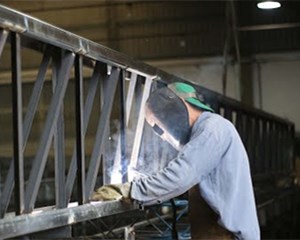JUDY WOODRUFF: As the American economy recovers from the worst impacts of the pandemic, questions remain about the labor force and the larger problems that plagued the economy prior to the start of COVID-19. In the final installment of Paul Solman's Work Shift series, he looks at what we have learned and what's at stake for workers and employers.
PAUL SOLMAN: All around us, jobs going wanting. But it couldn't just have been pandemic unemployment benefits and low wages keeping workers in dry dock, because a host of high-paying jobs have gone unfilled for a very long time.
VINNIE SPOSARI, Owner, Mr. Rooter Plumbing of Seattle: I have got plumbers that work for me today that make $200,000-plus a year.
PAUL SOLMAN: And yet Seattle plumbing contractor Vinnie Sposari has been unable to find workers for years.
VINNIE SPOSARI: I could hire six, eight experienced plumbers right now.
PAUL SOLMAN: So why the labor shortage?
SARAH SCHNABEL, Electrical Apprentice, LaMorte Electric: You're doing manual labor. Some people tend to look down on that.
PAUL SOLMAN: Sarah Schnabel, a Cornell grad, became an electrician.
SARAH SCHNABEL: For people my age, it's definitely more glamorous to think of the tech job, where you're in a really nice cushy office building.
PAUL SOLMAN: High schoolers in Southwest Louisiana had an added explanation.
JORDAN HOFFMAN, Student: That's not an option that's often presented to us. Like, this is not for you.
JACOB BREWSTER, Student: It's like, go to college, go to college. There's barely anybody saying, go to trade school.
PAUL SOLMAN: Right, said Mike Rowe, famous for his cable TV series "Dirty Jobs."
MIKE ROWE, "Dirty Jobs": The push for one form of education, in my view, really was the beginning of a long list of stigmas and stereotypes and myths and misperceptions that to this day dissuade millions of kids from pursuing a legitimate opportunity to make six figures in the trades.
PAUL SOLMAN: A final reason the trades are underpopulated, up until recently, some two-thirds of Americans were excluded, women, people of color, or both.
ADRIENNE BENNETT, President and CEO, Benkari: Dead rats in my lunch box, like the women before me. They wanted me to leave.
PAUL SOLMAN: Plumber Adrienne Bennett, who now runs her own firm.
ADRIENNE BENNETT: I was in a porta john one time. They picked me up with a crane. And you're bouncing around in there, you got this sewage. It's splashing all over you. You're afraid.
PAUL SOLMAN: Electrician Tonya Hicks also has her own company.
TONYA HICKS, President and CEO, Power Solutions International: I had a foreman to tell me that all Black women do is get fat, have a bunch of kids and collect welfare.

PAUL SOLMAN: But it's not just the trades that can't fill jobs today. Tons of low-wage workers seem to be fed up with their pay and work and just aren't taking it anymore. And maybe they shouldn't, says economist Byron Auguste.
BYRON AUGUSTE, President and Co-Founder, Opportunity@Work: During the pandemic, we saw tens of millions of essential workers do amazing things, things that required skills, that required adaptability, that required problem-solving, that required teamwork, that required communication under very difficult conditions.
PAUL SOLMAN: And given data collected by his firm, Opportunity@Work, they could be earning a lot more.
BYRON AUGUSTE: Thirty million today have the skills, based on the work they're doing, for jobs that pay at least 50 percent more than the jobs they're in.
PAUL SOLMAN: So, how to get those tens of millions of low-wage workers better opportunities? Government job training programs are one route, like Back to Work Rhode Island, where then-Governor Gina Raimondo used federal CARES Act money to fund training programs in areas where employers couldn't fill jobs.
GINA RAIMONDO, U.S. Secretary of Commerce: We will tailor these training initiatives so that, when you hire someone, you have confidence they're going to be able to do the job.
PAUL SOLMAN: Some 4,000 Rhode Islanders have already graduated into new higher-paying jobs. But, in general, says Professor Doug Besharov, government isn't the ideal overseer.
DOUGLAS BESHAROV, University of Maryland: It doesn't learn fast enough. It fights the last war. And change is happening more rapidly as we speak. And it will continue to happen. And I think government will be left behind.
ARIELLA SPITZER, Mathematica Policy Research: There's a huge body of research on government job training. And, overall, I would say the results are unfortunately disappointing.
PAUL SOLMAN: Economist Ariella Spitzer studies job training.
ARIELLA SPITZER: The good ones, we're seeing at most 5 to 10 percent earnings increase.











